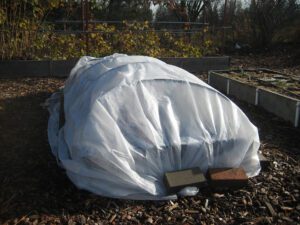Aug. 23 Column: Grow a Fall Garden

 Do you live in a region that has a short growing season? I sure do! In my zone 5b garden, we typically get our first frost in mid- to late September, which is right around the corner. But I still want to keep harvesting things from my garden. With that in mind, my column for today is about growing a fall garden. You can read it in The Spokesman-Review: Vegetables are plentiful in growing a fall garden. Or you can read the text of the column under the video below.
Do you live in a region that has a short growing season? I sure do! In my zone 5b garden, we typically get our first frost in mid- to late September, which is right around the corner. But I still want to keep harvesting things from my garden. With that in mind, my column for today is about growing a fall garden. You can read it in The Spokesman-Review: Vegetables are plentiful in growing a fall garden. Or you can read the text of the column under the video below.
In my column, I make suggestions of vegetable crops that grow quickly, which also includes some that are amazingly cold-tolerant. So if you want to keep growing your garden past the “traditional” end of your season, you’ll want to plant seeds ASAP!
In this week’s “Everyone Can Grow a Garden” video, I go through the second step of pruning your tomato plants so the green tomatoes will ripen. I also give you a quick update on the cover crops I recently planted (I shot a video on that a couple of weeks back) as well as the newly-planted lettuce, sorrel, turnips and carrots.
As I said in the video, it has been VERY HOT here! Up into the 100s which makes me melt. I’m just not a hot-weather gal! So I had to make the video a bit on the short side but knew you would understand. Here’s the video:
… and here’s my column. I hope you all have a great day!
by Susan Mulvihill
Do you have some room in your vegetable garden right now? Chances are, your lettuce, spinach and peas stopped growing when our hot temperatures arrived. If you pulled them up and have empty beds, think about growing a fall garden.
It’s natural to yearn for the end of the season when vegetable crops no longer keep you busy but I can guarantee you’ll miss having those fresh greens. In the Inland Northwest, our first frost usually arrives between mid- and late September. That’s not enough time to grow a second crop of peas but it’s certainly long enough to grow more lettuce and other leafy vegetables.
The first step is to choose some seeds. If you don’t have any lettuce seeds left from sowing them earlier this season, visit your local garden center to see what the options are.
I did some research to see which veggies grow in a very short time. Here are some suggestions:
You can start harvesting baby lettuces in 28 days and mature plants in 40 days. I like the idea of sowing salad mixes because you’ll get to harvest a nice variety of leaves that will look great in salads. I’ve grown Speckled Trout, red romaine and buttercrunch lettuce well into the fall and even had them survive most of the winter by giving them some frost protection. More on that in a moment.
I always use the cut-and-come-again method of harvesting salad greens. This involves picking individual leaves so the plants will continue producing new ones.
Spinach is another option. Both Matador and Monstruex de Viroflay have grown well for me through the fall and winter months. You can start harvesting leaves in 25 days.
If you enjoy eating kale, think about planting curly-leaved cultivars because they are really hardy. Look for Starbor, Winterbor, Darkibor or Redbor as they will even grow during the winter. They reach maturity in 55 days.
Pak choi is another tasty suggestion. You can start picking them in just 37 days. Swiss chard grows quickly and provides leaves for harvesting in 28 days. Radishes are also speedy growers that you can harvest in a mere 21 to 28 days, depending on the cultivar.
Some of you might recall that I grow cold-tolerant vegetables from the fall all the way through the winter. We have a small hoop house – a plastic-covered greenhouse also known as a poly tunnel – but you can use a simple set-up to get more produce out of your garden at least through the fall if not the winter. Why not take up the challenge and see how long you can grow your fall garden?
Protect your seedlings from the frosts by creating a mini greenhouse. I recommend making some hoops with ¾-inch black poly sprinkler pipe – which is inexpensive — and placing a sheet of floating row cover or clear plastic over them. Floating row cover is a lightweight fabric that lets sunlight and moisture pass through it while providing a few degrees of frost protection. It is available at large garden centers and from online sources.
If you opt for clear plastic, be sure to open the ends of the tunnel on bright, warm days or you will fry the poor plants growing underneath it. Remember to close it back down at night if the temperatures are going to drop below freezing.
I’d love to hear about your experiences with this, including what you grew and how long you kept them going during the colder weather. This is your chance to push the envelope!
Contact Susan Mulvihill at Susan@susansinthegarden.com. Watch this week’s “Everyone Can Grow a Garden” video at youtube.com/susansinthegarden.
